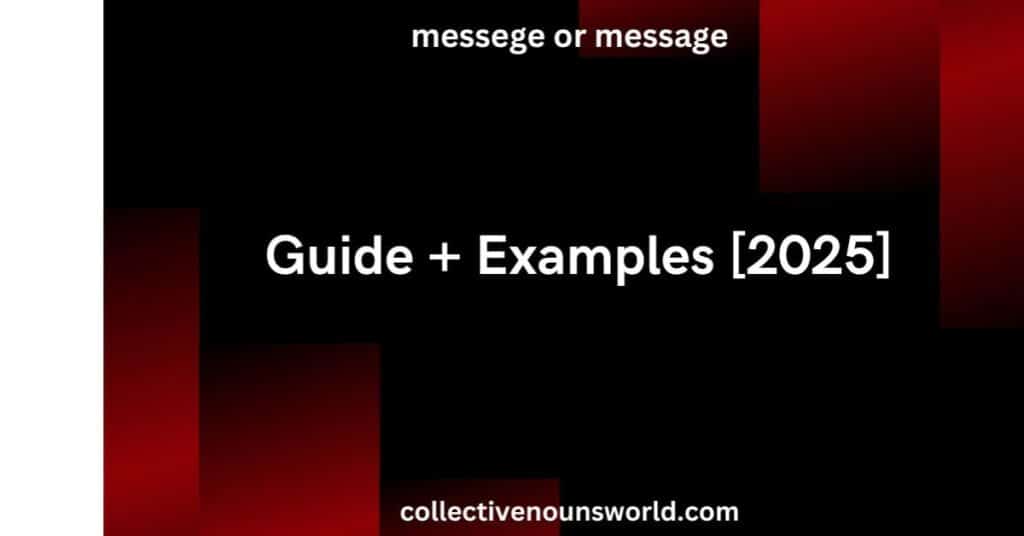Have you ever paused to think: What is the correct spelling—message or messege? You’re not alone. In written communication, spelling errors in English can cause confusion and even make your work look unprofessional. This comprehensive guide will help you understand the difference between message and messege, explain how to spell “message” correctly, and show why correct spelling is essential for effective communication.
Messege or Message: Which is Correct?
The correct spelling is “message.” The word “messege” is a common spelling mistake often made due to phonetic confusion or typos. English words sometimes sound different from how they’re spelled, which leads to errors in written communication.
The term “message” comes from Latin and Old French, referring to something sent from one person to another. The misspelled version, “messege,” doesn’t exist in the English language spelling system. Using “messege” can confuse your audience and harm your professional communication. Spelling correctly always leaves a better impression.
Why is “Message” the Correct Spelling?
The word “message” comes from the Latin word missus, meaning “sent.” It later evolved through Old French into Middle English as “message.” Over centuries, it became the standard spelling for something written, spoken, or transmitted electronically.
In digital communication, words like “message” are integral, especially in text messages and emails. Since “messege” is not a valid spelling, it’s crucial to avoid it to maintain clarity and professionalism in all forms of communication.
Why Do People Spell It as “Messege”?
Spelling errors like “messege” happen for a few reasons. One is phonetics—people spell words based on how they sound, and “messege” might seem logical to some ears. Another cause is typing too quickly, which leads to accidental errors.
These types of spelling mistakes in professional communication can reduce trust in your writing. Whether it’s a casual email or an official document, the right spelling—“message”—shows care and attention to detail.
Common Variants and Why They’re Incorrect
Several misspellings, like “mesage,” “messge,” and “messege,” appear in informal writing. However, none of these are valid. Each of these errors fails to capture the correct combination of letters required to form “message.”
Here’s a quick comparison of correct and incorrect forms:
| Correct Spelling | Incorrect Variants |
| Message | Messege, Messge, Mesage |
Avoiding these variants ensures your written communication stays clear and professional.
You may also like: What Kind of vs What Kinds of? Examples & Clear Differences
Why Spelling Accuracy Matters: Messege or Message
Spelling accuracy matters because it reflects your attention to detail and shapes how others perceive you. Whether you’re crafting a business proposal or chatting in digital communication, correct spelling ensures effective communication.
1. Professionalism in Writing: The Power of Detail
Using the correct spelling shows professionalism and builds credibility. When writing for work or school, errors like “messege” can undermine your authority and make you seem careless. Details like spelling convey respect for your audience.
2. Clarity and Readability: Making a Difference
Spelling impacts how easily readers understand your text. A misspelled word disrupts the flow and may confuse your audience. The correct spelling of “message” avoids unnecessary distractions.
3. Building Trust and Credibility
Trust begins with clear and accurate communication. A misspelled word like “messege” can reduce your credibility, especially in professional contexts. To establish authority, always ensure your spelling is correct.
4. Messege or Message for SEO: Impact on Digital Visibility
Even in digital communication, correct spelling boosts your online visibility. Search engines prioritize content that uses proper spelling, so errors like “messege” can hurt rankings.
5. First Impressions: Small Details Matter
When someone reads your writing, their first impression often comes from your attention to detail. Spelling “message” correctly signals effort and professionalism.
What Does “Message” Mean? Definition and Context
A message is a piece of information sent from one person to another, either verbally, in writing, or electronically. Examples include texts, emails, letters, or spoken instructions.
In modern contexts, messages play a crucial role in digital communication, allowing instant exchanges of ideas or information. Whether personal or professional, the word “message” represents clarity and intent.
You may also like: Tweek vs Tweak: Simple Explanation & Usage
Practical Tips for Avoiding “Messege” Errors
Avoiding mistakes like “messege” is easy with a few tips:
- Proofread your work: Always double-check for errors.
- Use spell-check tools: Most devices underline misspellings automatically.
- Learn mnemonics: Remember, there’s an “age” in “message.”
These small habits ensure you’ll always spell “message” correctly.
Examples of “Message” in Everyday Sentences
Here are some examples showing the correct usage of “message”:
- “I left a message on your voicemail.”
- “Please send me a message when you arrive.”
- “The message was clear: we need to work harder.”
Each example illustrates the proper context and clarity of the word.
Common Confusions: Message vs. Massage
Many confuse “message” with “massage.” However, their meanings are very different. A message is communication, while a massage is a therapy for the body. Here’s how they differ:
| Word | Meaning | Example |
| Message | Communication in writing or speech | “She sent me a message.” |
| Massage | Physical therapy for relaxation | “I booked a massage at the spa.” |
Pronunciation Tips: How to Pronounce “Message”
To pronounce “message,” break it into two syllables: MES-sij. Focus on the soft “g” sound at the end, which distinguishes it from similar words. Practice with examples to perfect your pronunciation.
How Consistency in Spelling Boosts Effective Communication
You may also like: Simpler or More Simple: Grammar Rules Made Easy
Consistent spelling creates clear and reliable communication. Whether in business or casual settings, using “message” correctly fosters trust and eliminates confusion. This principle is key to successful written communication.
Messege or Message and Related Terms
The word message has many related terms and phrases that extend its meaning across different contexts. These words not only help clarify its use but also provide a broader understanding of its role in effective communication. Unlike “messege,” which is simply a typo, these related terms are valid and widely used in the English language spelling system.
For example, “messenger” refers to someone who delivers a message, whether physically or digitally, such as in apps like Facebook Messenger. Similarly, a text message is a specific type of message sent via mobile devices. Other related terms include instant messages (IMs), which are often exchanged in real-time on platforms like WhatsApp, and voicemail messages, which combine audio with the purpose of relaying information. In business contexts, terms like email message or corporate messaging are frequently used, emphasizing the professional importance of communication tools.
Here’s a table showcasing related terms and their meanings:
| Related Term | Meaning |
| Messenger | A person or app that delivers messages |
| Text Message | A short, typed communication sent via mobile phone |
| Instant Message (IM) | Real-time text communication online or via chat apps |
| Voicemail | An audio recording left when a call isn’t answered |
| Email Message | A written message sent electronically through email systems |
| Communication | The broader act of exchanging information through messages |
Bonus Tips for Remembering “Message”
To remember “message,” think of the word “messenger.” Both share the same root and are linked to communication. Visualizing the word in context also helps avoid errors like “messege.”
Message vs. Messege: Unraveling the Confusion
Confusion between “message” and “messege” stems from how English words sound versus how they’re spelled. However, the correct form—“message”—is easy to remember with practice.
The Importance of Correct Spelling
Spelling matters because it ensures clarity, builds trust, and reflects your effort. Words like “message” are foundational to clear and impactful communication in the English language spelling system.
Correct spelling is the cornerstone of great writing. With this guide, you’ll never confuse “message” with “messege” again. Remember, the small details—like spelling—can make a big difference!
You may also like: IHH Meaning in Text: Simple Guide & Examples
Common Misspellings and Their Impact
Spelling errors like “messege” instead of “message” can lead to confusion and misinterpretation. For example, a job application containing multiple misspellings can harm a candidate’s chances by making them appear careless. In professional settings, such mistakes may undermine the credibility of emails or reports, causing reputational damage. Even in personal communication, errors can lead to misunderstandings, especially when clarity is critical. Correct spelling is not just about formality; it ensures that your written communication is easily understood and taken seriously.
For instance, someone writing “messege” instead of “message” in a client email might appear less competent. Errors like these also negatively affect search engine optimization (SEO) since search algorithms favor correctly spelled keywords like “message.” Accurate spelling builds trust and enhances readability, which is crucial in all forms of communication.
How to Remember the Correct Spelling
Remembering the correct spelling of “message” is easier with simple techniques. A helpful trick is to break the word into chunks: “mes-sage.” Visualizing the correct word alongside its meaning, such as picturing a letter or text bubble, can strengthen memory. Mnemonics, like “Message Ends with a Sage,” can also be effective for recall.
Another method is repetition. Practice typing or writing “message” multiple times to form a habit. Reading frequently in English can help as well, exposing you to the correct spelling in various contexts. Apps like Grammarly or browser-based spell checkers offer real-time feedback, helping you avoid common errors and build confidence in spelling.
Enhancing Your Writing Skills
Improving your overall writing skills involves a combination of consistent practice and the use of helpful tools. Enroll in online courses like those on Udemy or Coursera that focus on grammar and spelling tips. Books on effective writing, such as “The Elements of Style” by Strunk and White, are excellent resources for mastering spelling and grammar rules.
Daily habits like journaling, reading high-quality articles, and using grammar-check tools can also refine your skills. Apps like ProWritingAid or dictionaries, such as Merriam-Webster’s, can provide instant corrections and definitions. Over time, these strategies will improve both your confidence and the clarity of your writing.
The Evolution of Messaging
Messaging has transformed dramatically over the centuries, from handwritten letters to instant digital communication. In earlier times, messages were delivered by hand, often taking weeks to reach their recipients. With the invention of the telegraph and telephone, communication became faster and more accessible.
Today, digital platforms like WhatsApp, Slack, and email dominate. The shift to instant messaging has not only increased speed but also introduced new challenges, such as maintaining spelling accuracy in casual communication. Despite this evolution, the core purpose of messaging remains the same: to connect people efficiently.
The Impact of Digital Communication
The rise of digital communication has significantly influenced spelling habits. Shortened forms like “u” for “you” or “msg” for “message” are now common in text messaging and social media. While these shortcuts save time, they can harm spelling accuracy over time, especially for younger users accustomed to informal writing styles.
However, technology also provides solutions. Predictive text, autocorrect, and grammar apps help users avoid spelling mistakes. For instance, if you accidentally type “messege,” most smartphones will suggest the correct spelling, “message.” Balancing convenience with proper spelling is key to maintaining both clarity and professionalism in digital communication.
Professionalism and Clarity
Polished writing is a reflection of professionalism and a cornerstone of effective communication. Whether it’s a business proposal or a casual email, correct spelling demonstrates attention to detail. Errors like “messege” can detract from your message, leading others to question your reliability or expertise.
Clarity is equally important. A well-written message ensures that readers quickly grasp your intent without distractions. In workplaces, where clear instructions or feedback are critical, polished communication strengthens teamwork and boosts productivity. Focusing on spelling and grammar is a small effort that yields significant professional benefits.
Building Language Skills
Continuously improving your language skills is essential for clear and confident writing. Start by reading widely in English, from novels to news articles, to familiarize yourself with proper spelling and word usage. Practice writing regularly, even if it’s just journaling or drafting short emails, to build consistency.
Learning apps like Duolingo or Rosetta Stone can also help improve your spelling and grammar knowledge. Pair these tools with active learning, such as keeping a vocabulary notebook or participating in language games. Developing your language skills is not just about avoiding mistakes; it’s about expressing yourself effectively.
Tips for Avoiding Spelling Mistakes
Avoiding common spelling errors like “messege” requires proactive strategies. Keep a dictionary app on your phone for quick lookups, or install grammar tools like Grammarly for instant feedback. When writing, take a moment to proofread and identify any errors.
Another tip is to slow down while typing. Rushing increases the likelihood of mistakes, especially with tricky words. You can also maintain a list of words you frequently misspell and review them periodically. Over time, these small habits will lead to greater accuracy in your writing.
Language in the Digital Age
Technology has revolutionized how we use language, bringing both challenges and opportunities. Autocorrect features and predictive text tools have made writing faster, but they’ve also made users more dependent on software to catch errors. This reliance can weaken natural spelling skills over time.
On the flip side, digital tools like grammar-checking apps encourage learning and self-correction. Language evolves in the digital age, with new words and phrases emerging regularly. To navigate these changes effectively, it’s essential to stay mindful of spelling accuracy while embracing the conveniences technology offers.
Which One Has the Correct Spelling? Messege or Message?
The correct spelling is undoubtedly “message.” The word “messege” is a common misspelling and does not exist in the English language as a proper term. The word “message” originates from Old French “message” and Latin “missaticum,” both referring to a communication or dispatch. As the standardized form in English, “message” is universally recognized and used in both formal and informal settings.
Using the correct spelling is essential for ensuring clarity in written communication. Whether crafting a professional email or a casual text, mistakes like “messege” can lead to misunderstandings or portray carelessness. To maintain credibility and precision in your writing, it’s crucial to stick with the correct form—message.
1. The Correct Spelling: Message
The proper spelling, “message,” is the standard in all contexts, whether it’s formal correspondence, casual conversations, or technical writing. Sticking to “message” ensures you communicate effectively and maintain professionalism. In contrast, “messege” is not recognized by dictionaries or grammar guides, making it an error that stands out for all the wrong reasons.
Correct spelling is more than just a detail—it’s a reflection of your language skills and attention to accuracy. Writers, students, and professionals must prioritize correct usage to avoid confusion and foster better communication.
2. Definition and Usage of “Message”
A “message” refers to a piece of communication sent from one person to another. This can include verbal communication, written notes, or digital texts. Its versatility makes it a foundational term in modern digital communication, encompassing emails, text messages, and social media interactions. For example, sending a message might mean leaving a voicemail, writing an email, or texting a friend.
In broader terms, a “message” can convey ideas, emotions, or instructions. It’s commonly used in business settings to refer to announcements or updates and in personal communication for casual interactions. Regardless of the context, spelling it correctly is key to ensuring your intent is understood.
3. Examples of “Message” in Sentences
Relatable examples can make the proper usage of “message” easier to grasp:
- “She left me a message about the meeting tomorrow.”
- “Did you read the message I sent on WhatsApp?”
- “The CEO’s message to employees emphasized teamwork and innovation.”
These examples illustrate how “message” is used in daily life across professional and personal contexts. Familiarizing yourself with such sentences helps reinforce the correct spelling and its application.
4. Common Mistakes: “Messege”
The misspelling “messege” often arises due to phonetic confusion, as it sounds similar to the correct spelling. Typographical errors are another common reason, especially when typing quickly or using devices without spell-check. Additionally, non-native English speakers may struggle with this word due to inconsistencies in English language spelling rules.
Unfortunately, “messege” is incorrect and can lead to misunderstandings or a poor impression, particularly in professional communication. Recognizing why this error occurs can help you consciously avoid it in your writing.
5. Importance of Correct Spelling
Spelling words correctly, like “message,” is vital for ensuring effective communication and building trust with your audience. Incorrect spellings, such as “messege,” can detract from your credibility, confuse your readers, and harm your SEO rankings. Search engines prioritize content with accurate keywords, so consistent use of “message” over “messege” ensures your content reaches the right audience.
Whether you’re writing for personal, professional, or digital purposes, correct spelling reflects professionalism, improves readability, and fosters clearer communication. Paying attention to such details is a small but impactful way to elevate your writing.
FAQs
What is the difference between message and messege?
“Message” is the correct spelling for communication, while “messege” is a common misspelling.
Is message grammatically correct?
Yes, “message” is grammatically correct and widely used in written and spoken English.
What is message and massage?
“Message” refers to communication or information, while “massage” means a physical therapy involving the body.
What is the definition of a message?
A “message” is information conveyed through speech, writing, or other means to communicate with someone.
Conclusion
The correct spelling is “message,” not “messege.” Spelling mistakes can harm your credibility and create confusion in communication. Understanding the word’s meaning, usage, and context ensures clarity and professionalism in writing. Whether for emails, text messages, or social media, getting it right matters.
By practicing proper spelling and using tools like spell-check, you can avoid errors like “messege.” Focus on learning, improving your language skills, and making a positive impression through clear and accurate communication every time.

Luna Jasper is an experienced blogger with a passion for language and grammar. At **Collective Nouns World**, she shares her expertise in exploring the fascinating world of collective nouns, making learning both engaging and fun. With years of writing and research under her belt, Luna’s insightful articles help readers understand and appreciate the English language.







